Cremation, Caste, and Cosmogony in Karmic Traditions.
Cremation, Caste, and Cosmogony in Karmic Traditions.
Cremation, Caste, and Cosmogony in Karmic Traditions.
Create successful ePaper yourself
Turn your PDF publications into a flip-book with our unique Google optimized e-Paper software.
Low-castes <strong>in</strong> Bangladesh<br />
Chapter 5:<br />
“I am on my dharma, but Kali is on my karma”<br />
This part will analyse death <strong>and</strong> life-giv<strong>in</strong>g waters from<br />
the vantage po<strong>in</strong>t of the low-castes <strong>in</strong> Faridpur <strong>in</strong><br />
Bangladesh. Faridpur is a small town located along<br />
Ganges 130 kilometres southeast of Dhaka (fig. 5.1). In<br />
a H<strong>in</strong>du m<strong>in</strong>ority <strong>and</strong> Muslim dom<strong>in</strong>ated world, lowcastes<br />
have different schemes for perceiv<strong>in</strong>g their own<br />
life-worlds compared to high-castes <strong>and</strong> priests <strong>in</strong> a<br />
H<strong>in</strong>du majority world. Anthropological studies <strong>in</strong> India<br />
have focused largely on the higher castes or on the lower<br />
castes from the vantage po<strong>in</strong>t of the higher (Mencher<br />
1998:37). Any study which only sees the low-castes<br />
from the perspective of the high-castes, <strong>and</strong><br />
consequently places them at the bottom of the social <strong>and</strong><br />
religious ladder, is biased.<br />
Inden stresses that “persons as agents are themselves<br />
composed of entities that overlap” (Inden 2000:25), <strong>and</strong><br />
therefore, “…agents are constituted neither as systems <strong>in</strong><br />
the classical mechanical sense nor outside of natural<br />
systems <strong>in</strong> the opposite, idealist sense. They are<br />
constituted as systems, but the systems…are constructed<br />
along different l<strong>in</strong>es. They consist of overlapp<strong>in</strong>g entities<br />
which agents themselves are mak<strong>in</strong>g, remak<strong>in</strong>g <strong>and</strong><br />
relat<strong>in</strong>g to one another through a dialectical process <strong>in</strong>to<br />
“scales of forms” “ (ibid:23).<br />
The emphasis on agency softens up the sharp <strong>and</strong><br />
hierarchical positions of caste systems as they are<br />
normally presented. “The shift from a quest for essences<br />
to a focus on agency, the shift from the posit<strong>in</strong>g of a<br />
substantialized agent to the description of the actual,<br />
transitory agents entails a heightened focus on the<br />
actions of those agents <strong>and</strong> the constitution of those<br />
agents themselves” (Inden 2000:264). Social sciences <strong>in</strong><br />
India have developed from Western rather than Indian<br />
cultural realities, <strong>and</strong> hence, there is a need for<br />
construct<strong>in</strong>g a theoretical social science that builds on a<br />
general system of concepts from the culture’s own<br />
natural categories that will be analytically powerful<br />
without violat<strong>in</strong>g the culture’s ontology, presuppositions,<br />
or its epistemology (Marriott 1990).<br />
See<strong>in</strong>g the world from the perspective of the low-caste<br />
enables other <strong>in</strong>sights <strong>and</strong> perspectives, which challenge<br />
the high-caste’s hegemony of the worldview. The term<br />
“low-caste” is used <strong>in</strong> the current lack of more<br />
satisfactory alternatives <strong>and</strong> due my comparative<br />
approach, which is related to the previous volum<strong>in</strong>ous<br />
anthropological debate that has described people <strong>and</strong><br />
groups as “low-caste”. I reject as a humanist, of course,<br />
any negative connotation connected to “low-caste.<br />
75<br />
Bangladesh is the third largest Muslim country <strong>in</strong> the<br />
world after Indonesia <strong>and</strong> Pakistan. Be<strong>in</strong>g a H<strong>in</strong>du <strong>in</strong><br />
Bangladesh is different from be<strong>in</strong>g a H<strong>in</strong>du <strong>in</strong> Nepal.<br />
The lives that Allah gives <strong>in</strong>clude the water world of<br />
floods, which turn the pla<strong>in</strong>s <strong>in</strong>to noth<strong>in</strong>g but water<br />
(Gardner 1997:18). Bangladesh is often flooded <strong>and</strong><br />
seventy percent of the country is covered with water<br />
each year. The rivers give life but also take life, <strong>and</strong> the<br />
relation between life, death, <strong>and</strong> water is <strong>in</strong>tricately<br />
<strong>in</strong>terwoven <strong>and</strong> structured around the goddesses Kali <strong>and</strong><br />
Ganga.<br />
Although the physicality of death is the same<br />
everywhere – a corpse – the social <strong>and</strong> religious worlds<br />
<strong>in</strong> which death are <strong>in</strong>corporated <strong>in</strong>to are dependent upon<br />
but not determ<strong>in</strong>ed by the ecological <strong>and</strong> environmental<br />
factors. A water perspective is therefore an approach by<br />
which it is possible to theorise <strong>and</strong> develop an<br />
underst<strong>and</strong><strong>in</strong>g of how humans with the same religion but<br />
liv<strong>in</strong>g <strong>in</strong> totally different environments are able to deal<br />
with <strong>and</strong> h<strong>and</strong>le the same problem: death <strong>and</strong> the recreation<br />
of further life. Thus, this part is ma<strong>in</strong>ly<br />
empirical <strong>and</strong> the aim is to present a detailed account of<br />
the actual lives of low-castes <strong>and</strong> their relations to water<br />
<strong>and</strong> the high-religion’s perceptions. The social <strong>and</strong><br />
physical environment challenge the believers to f<strong>in</strong>d<br />
radical solutions to the answers provided by the highreligion<br />
<strong>and</strong> the Brahmans.<br />
The Bangladesh government tried to implement<br />
secularism when the first constitution was passed on<br />
November 4 th 1972, <strong>and</strong> it abolished all k<strong>in</strong>ds of<br />
communalism, gave political recognition of any religion<br />
by the state, banned exploitation of religion for political<br />
ends <strong>and</strong> discrim<strong>in</strong>ation of anybody on religious grounds<br />
(Mosh<strong>in</strong> 1983:23). Despite the government’s good<br />
<strong>in</strong>tentions, the social realities were different. In<br />
Bangladesh it has been a trend to view caste as solely a<br />
cultural phenomenon <strong>and</strong> thus limited to the H<strong>in</strong>du<br />
m<strong>in</strong>ority. In structural aspects caste is applicable to all<br />
religions despite the cultural variation. Although it is<br />
stated <strong>in</strong> the Quran that God created all men <strong>and</strong><br />
preached equality, the followers of Islam have partly<br />
neglected this doctr<strong>in</strong>e, <strong>and</strong> the Muslims are classified <strong>in</strong><br />
hierarchical orders (Ali 1992:3). In a traditional caste<br />
society the <strong>in</strong>dividual’s status stems basically from the<br />
status of the caste, whereas <strong>in</strong> a class society the<br />
<strong>in</strong>dividual’s status is a result of his own attributions<br />
(ibid:23). Nevertheless, Ali argues that <strong>in</strong> Bangladesh<br />
both caste <strong>and</strong> class hierarchy are mostly determ<strong>in</strong>ed by<br />
economic <strong>and</strong> political powers of the occupations <strong>and</strong><br />
therefore, “there is no difference between caste <strong>and</strong><br />
class. In other words, caste is class” (ibid:31).


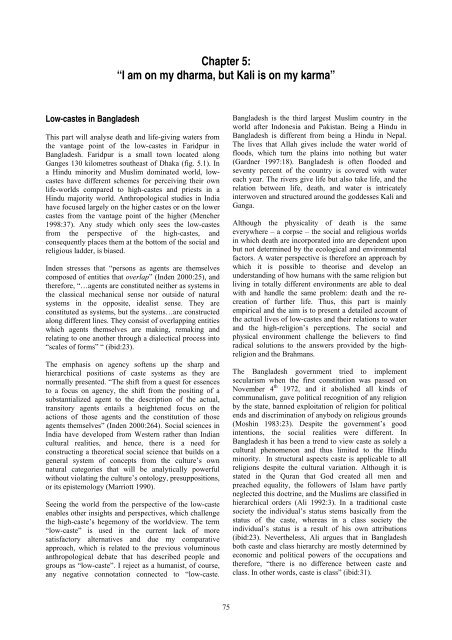
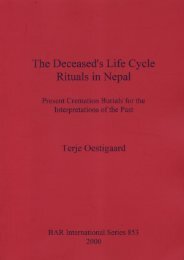
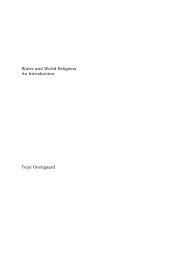

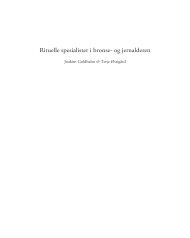
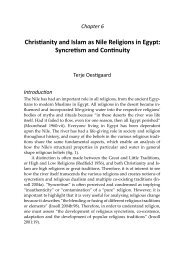
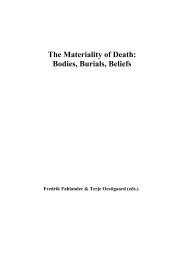
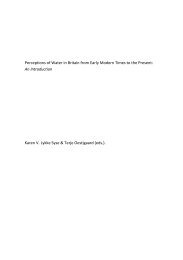

![Fullmono-AK [P2118].indd - oestigaard](https://img.yumpu.com/18994998/1/177x260/fullmono-ak-p2118indd-oestigaard.jpg?quality=85)